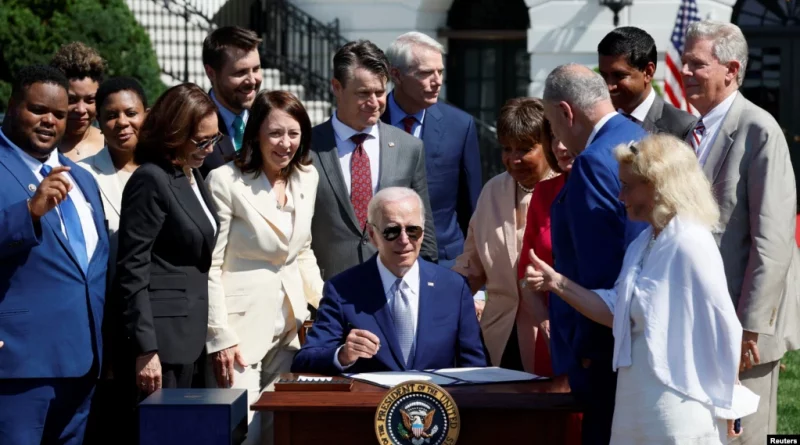Biden signed into law a bill to encourage computer chip manufacturing in the U.S.
Biden signed into law a bill to encourage computer chip manufacturing in the U.S.
President Joe Biden signed a new bill to provide $52.7 billion in subsidies for U.S. semiconductor manufacturing and research, and to allow the U.S. to better compete with China in science and technology.
“The future will be made in America,” Biden said, calling the measure “a once-in-a-generation investment in America.”
Some Republicans joined Biden on the White House lawn to attend the signing of the chip bill, which has been brewing in Congress for several years.
Along with lawmakers at the signing were executives from Micron, Intel, Lockheed Martin, HP and Advanced Micro Devices, as well as the governors of Pennsylvania and Illinois and the mayors of Detroit, Cleveland and Salt Lake City.
The White House said passage of the bill would spur new investment in chips, noting that Qualcomm on Monday agreed to buy another $4.2 billion in semiconductors from its GlobalFoundries plant in New York, bringing the total commitment to $7.4 billion through 2028.
The White House also reported that Micron announced a $40 billion investment in memory chips that would increase U.S. market share from 2 percent to 10 percent, which would be subsidized by the chip bill.
The legislation is also aimed at meeting the demand for chips, a shortage of which has affected all areas of manufacturing – cars, guns, washing machines and video games.
This very important new law in U.S. industrial policy also includes a 25 percent investment tax credit for chip factories, estimated at $24 billion.
The law would provide $200 billion over 10 years to stimulate research in the U.S. to better compete with China. Congress would have to pass separate appropriations legislation to fund this investment.
China’s embassy in Washington said China “strongly opposes” the bill, calling it reminiscent of a “Cold War mentality.”
Biden noted that the U.S. needs chips for key weapons systems such as Javelin missiles.
“Not surprisingly, the Chinese Communist Party actively lobbied American business against this bill,” Biden said.
Many U.S. lawmakers said they don’t typically support significant subsidies for private businesses, but noted that China and the EU provide billions of dollars in incentives to their chip companies. They also cited national security risks and huge problems with the global supply chain that hamper global manufacturing.
